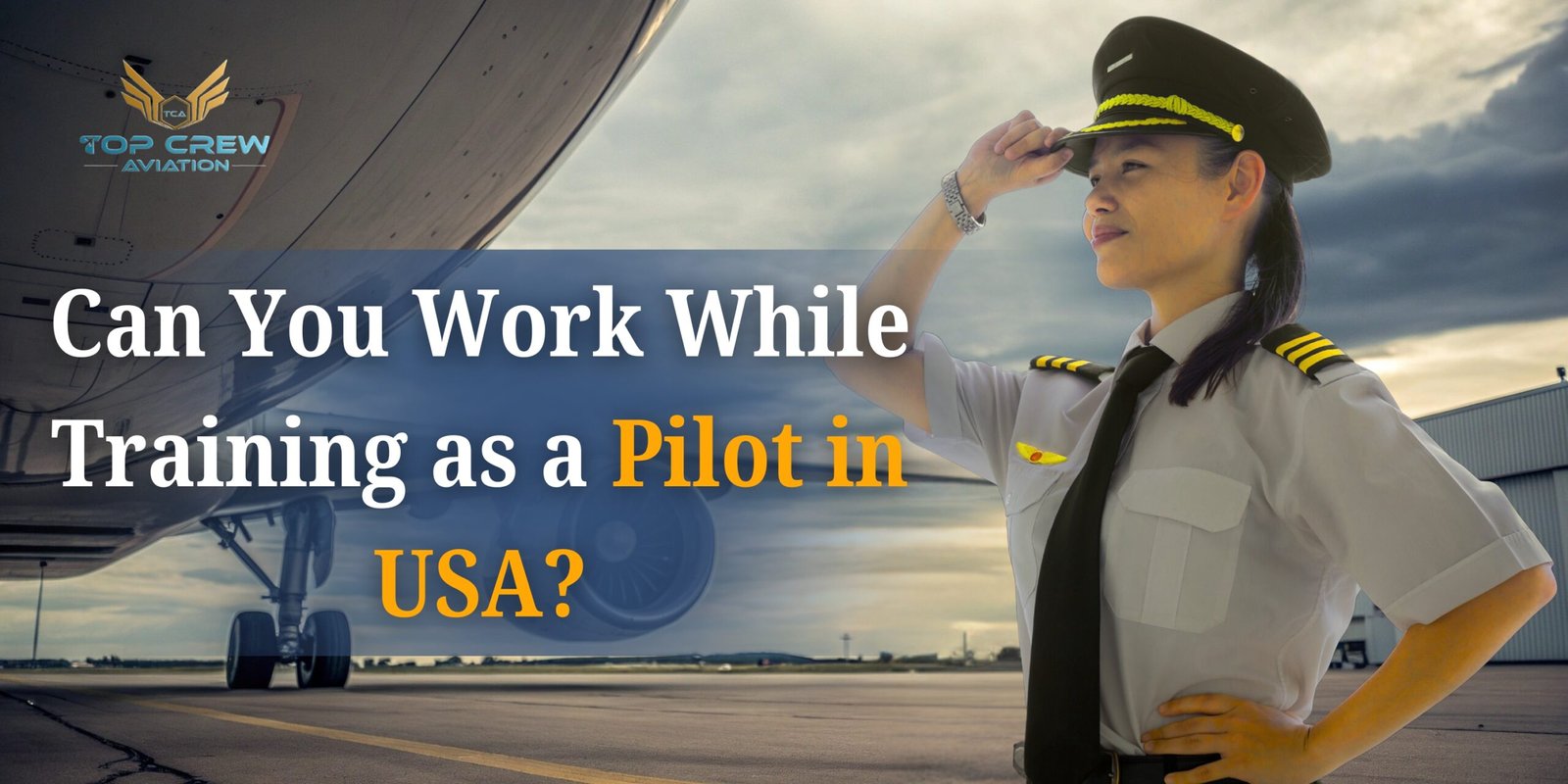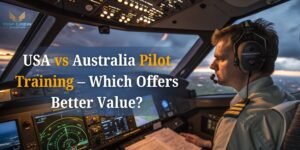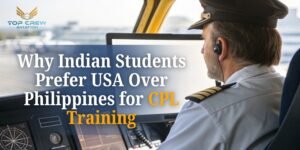Introduction
For many aspiring pilots, the United States is one of the best destinations for world-class flight training. However, a common question arises among international students — Can you work while training as a pilot in USA?
Balancing pilot training in USA with part-time work can be challenging due to visa rules, training schedules, and workload. This blog explains everything you need to know about working during pilot training study in USA, the F1 visa regulations, and how to manage your time effectively.
Can You Work While Training as a Pilot in USA?
Yes, but with strict limitations. International students enrolled in USA flight schools on an F1 visa are allowed to work only under specific conditions. These typically include on-campus jobs and certain authorized training programs.
It’s essential to understand that pilot training in USA is often full-time and demanding, which makes working simultaneously difficult but not impossible.
Understanding Pilot Training Requirements in USA
Before considering part-time work, it’s vital to know what pilot training requirements in the USA involve.
To become a commercial pilot, students go through stages such as:
- Private Pilot License (PPL)
- Instrument Rating (IR)
- Commercial Pilot License (CPL)
- Multi-Engine Rating (MER)
Each stage includes ground classes, simulator sessions, and flight hours. Therefore, training schedules are rigorous and can take 12–18 months to complete, depending on whether you choose full-time or part-time pilot training.
Suggestion Blog URL:- FAA CPL License Process Explained – Step by Step
Full-Time vs Part-Time Pilot Training – What’s the Difference?
Full-time pilot training requires consistent attendance and flight scheduling throughout the week. Students under this mode complete their training faster but have little free time for employment.
Part-time pilot training, on the other hand, allows more flexibility and is often chosen by those who want to balance flight training jobs in USA or part-time work with studies.
However, most international students must remain enrolled as full-time students due to pilot training F1 visa regulations.
Can International Students Work During Pilot Training in the USA?
International students on an F1 visa face specific restrictions. According to pilot training visa regulations USA, students can only work:
- Up to 20 hours per week during the semester, and
- Full-time during official school breaks (with authorization).
This applies mainly to on-campus employment such as working in libraries, cafeterias, or administrative offices.
F1 Visa Rules for Working During Flight Training
Under F1 visa pilot students regulations, working off-campus without proper authorization is prohibited.
There are a few exceptions where students can gain practical experience related to pilot training jobs in USA, such as:
- Curricular Practical Training (CPT) – Allows work that’s part of the official training curriculum (for example, as a flight instructor).
- Optional Practical Training (OPT) – Enables graduates to work in the aviation field for up to one year after completing their course.
Both CPT and OPT are excellent ways to gain pilot work in America legally.
Types of Jobs Allowed for Student Pilots in the USA
There are two main categories of jobs students can consider during their pilot training study in USA:
1. On-Campus Jobs
- Library or front desk assistant
- Cafeteria or support staff
- Student services assistant
These positions comply with F1 visa regulations and are generally flexible around your training hours.
2. CPT or OPT Authorized Work
After completing part of your training, you might qualify for flight training jobs for students, such as:
- Flight instructor
- Ground school assistant
- Dispatcher or training coordinator
These roles give valuable aviation experience while earning income.
On-Campus Jobs for Flight Training Students
On-campus employment is the safest and most straightforward way for international students to work.
Positions like data entry, clerical work, or maintenance roles in USA flight schools allow students to gain work experience without violating visa terms.
Such roles help you cover minor expenses during pilot training in USA.
Off-Campus Work Opportunities and Legal Limitations
Off-campus employment is strictly regulated. Students can apply for it only if they face severe economic hardship and after completing at least one academic year.
Unauthorized off-campus work can lead to visa cancellation. Therefore, always ensure your pilot training work permit in USA aligns with F1 visa conditions.
Can You Work After Completing Flight Training in the USA? (OPT Rules)
Once you complete flight training in USA, you can apply for Optional Practical Training (OPT).
OPT allows you to work legally in the U.S. for 12 months in a field related to your major — aviation, in this case.
Many F1 visa pilot students use OPT to work as flight instructors or pursue pilot job options in USA.
How to Balance Pilot Training and Part-Time Work
Finding balance is key when handling flight training work-life in the USA.
Tips include:
- Choose on-campus jobs with flexible hours.
- Schedule flights during the day and work in evenings.
- Avoid overworking; fatigue can affect flight performance.
- Prioritize your flight lessons over short-term income.
Learning how to balance flight training and job in USA is an essential skill for long-term success.
Is It Advisable to Work While Enrolled in Flight School?
While possible, it’s not always advisable.
Flight training is intense, and managing a part-time job can slow your progress.
However, if you can manage time efficiently, working part-time can help with living expenses and build discipline.
Average Pilot Training Schedule and Free Time Availability
A typical pilot training in USA schedule involves:
- 3–5 flying days per week
- 2–3 ground sessions
- Regular simulator practice
This tight routine means students get limited free time. USA flight schools work-life balance depends on personal time management.
How Working Can Affect Your Flight Training Performance
Fatigue and distraction from part-time work can reduce focus during flying lessons.
Maintaining energy, sleep, and study time is crucial for safety and success. Always ensure work commitments do not interfere with training progress.
Tips for Managing Time Between Flight Classes and Work Hours
- Create a weekly schedule and stick to it.
- Prioritize rest before early-morning flights.
- Communicate with your instructors about your job schedule.
- Choose nearby jobs within your campus or aviation academy.
These steps ensure smooth flight training work-life balance.
Top Part-Time Jobs Suitable for Pilot Students in the USA
Some suitable part-time jobs include:
- Library or student office assistant
- Tutor for English or basic math
- Flight simulator operator
- Cafeteria or reception assistant
Such roles fit within the pilot training work permit in USA guidelines and do not conflict with your flight schedule.
Earning While Learning – Is It Financially Worth It?
Working part-time during pilot training in USA can help cover minor costs like food and transport, but not tuition.
Flight training is a costly investment, and the pilot training cost can range between $60,000–$90,000.
Thus, part-time work helps with expenses but won’t drastically reduce financial burdens.
Flight School Recommendations for Working Students
Leading USA flight schools recommend focusing primarily on training during the initial months. Once your schedule stabilizes, you may explore work opportunities for flight school students in USA.
Some schools also provide career counseling and authorized job listings for flight training jobs in USA.
Important DGCA & FAA Guidelines for Student Pilots (for Indian Students)
Indian students must ensure their pilot training in USA aligns with DGCA (India) and FAA (U.S.) standards.
Upon returning to India, DGCA requires specific flight hours, medical certificates, and conversion exams.
Students should avoid unauthorized employment, as it can impact both U.S. visa status and DGCA recognition.
Common Mistakes Students Make While Trying to Work and Train Together
- Ignoring visa restrictions
- Overcommitting to work hours
- Missing training sessions due to fatigue
- Taking unapproved off-campus jobs
Avoiding these mistakes ensures smooth pilot training study in USA and a valid F1 visa record.
How Top Crew Aviation Can Help You
Top Crew Aviation guides students in choosing the best pilot training in USA, understanding visa regulations, and managing career growth.
They offer expert counselling for DGCA and FAA-approved flight schools, visa guidance, and time management strategies for working students.
Why Choose Top Crew Aviation
- Guidance for F1 visa pilot students
- Support for DGCA and FAA documentation
- Partnerships with reputed USA flight schools
- End-to-end training and career planning assistance
With Top Crew Aviation, your journey of training as a pilot in USA becomes smoother and stress-free.
Final Verdict – Should You Work While Training as a Pilot in the USA?
So, can you work while training as a pilot in USA?
Yes, but within limits. You can take on on-campus jobs, CPT, or OPT-approved roles. However, your main focus should remain on flying and academics.
Working can help financially, but safety and skill development come first in aviation.
With proper time management, authorized employment, and expert guidance from Top Crew Aviation, you can achieve your dream of becoming a professional pilot in America.
Suggestion Blog URL:-



